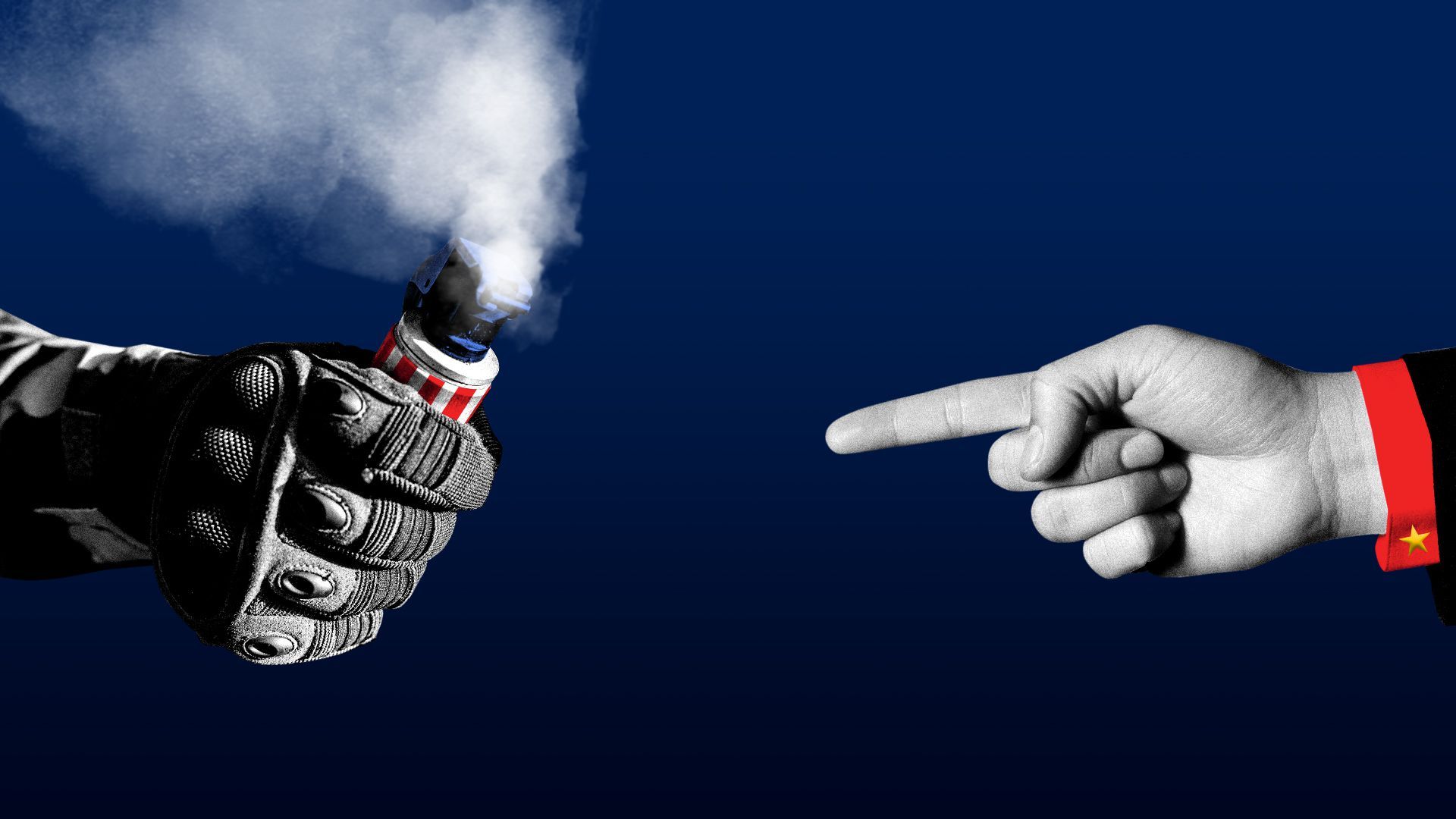China claims double standard as protests rock U.S.
Add Axios as your preferred source to
see more of our stories on Google.

Illustration: Aïda Amer/Axios
Some U.S. elected officials who expressed support for the Hong Kong protests have now called for military suppression of the ongoing protests in the U.S. — a fact that Chinese state media and government officials have been happy to call out.
Why it matters: The Chinese Communist Party is eager to convince a domestic audience that democracy is dangerous and that U.S. support for human rights is cynical.
What they're saying: Hong Kong chief executive Carrie Lam slammed the U.S. this week, saying the recent protests show that Washington has applied "double standards" in its criticism of Hong Kong and Beijing.
- "You know there are riots in the United States and we see how local governments reacted. And then in Hong Kong, when we had similar riots, we saw what position they adopted then," said Lam.
- Party newspaper The People's Daily published a cartoon showing the Statue of Liberty crushing houses like Godzilla. The caption read "Under human rights."
- “This situation in the U.S. will make more Chinese people support the Chinese government in its efforts to denounce and counter America,” Song Guoyou, a professor in American studies at Fudan University in Shanghai, told the New York Times in an interview. “The moral ground of the United States is indeed greatly weakened.”
Context: Hong Kong pro-democracy protests paralyzed the city for much of the past year, often peaceful but with notable episodes of violence as police ratcheted up their own response.
- Hong Kong police, once known as "Asia's finest," became increasingly violent over the course of the movement, drawing intense global scrutiny for their ready use of tear gas and rubber bullets that blinded several protesters and a journalist in one eye.
- In August 2019, after several months of protests, Beijing said the Hong Kong protests showed "signs of terrorism." China's leaders increasingly cast the protests as a national security threat needing a firm military response.
U.S. elected officials, meanwhile, have consistently expressed support for the Hong Kong pro-democracy movement, even when some protesters became violent.
- Sen. Tom Cotton (R-Ark.) tweeted in November 2019 that "police violence against protestors in Hong Kong in unacceptable."
Chinese media outlets have been swift to point out that some of those same U.S. government officials have not supported a domestic protest movement that has also been characterized by intense moments of both police and protester violence.
- Some U.S. protesters and journalists have now been blinded by rubber bullets, and police have fired tear gas at peaceful crowds. Some police officers have been wounded.
- Cotton's comments regarding the U.S. protests have been markedly different from his comments on Hong Kong. He tweeted on June 2 that "the only way to end this insurrection is the overwhelming display of force." Another tweet referred to "terrorists."
The big picture: The Chinese Communist Party has long sought to convince people in China that democracy is inherently chaotic.
- U.S. gun violence often gets prime coverage in China's heavily censored media environment.
- The party has carefully controlled coverage of the Arab spring and other pro-democracy movements around the world, censoring images of solidarity and information about gains made through protest, while putting images of violence and anarchy on the front page.
But what's largely missing from Chinese state media commentary is discussion of the pride that many people feel at seeing so many fellow Americans rise up against racial injustice.
- More than 140 cities have seen protests, and many U.S. government officials on the local, state and national levels have publicly stated their support, and even joined protesters.
- The Chinese Communist Party knows that this pride and popular support goes against their narrative that protest, and thus democracy, is chaotic and undesirable.
The bottom line: Chinese Communist Party leaders are elevating the U.S. government response to protests to their own benefit but can't talk about the wave of popular support protests in the U.S. have received; to do so would grant legitimacy to a political model the party fears.
